Why am I So Stressed Out About Starting Solid Foods? with Andrea Niles, PhD
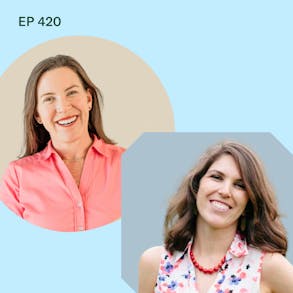
LISTEN TO THIS EPISODE
Episode Description
Do you feel anxious about your baby starting solid foods? Nervous that your baby will choke on food? Raising babies is stressful…and we don’t always get the support we need as new moms. Today I’m joined by someone who thinks we should be doing things - and supporting new moms differently
Her name is Andrea Niles, she’s a clinical psychologist and mom of 2. Andrea is the founder of Prospera Mental Health and Wellness, which provides one on one weekly sessions with perinatal certified mental health coaches.
…and in this interview she shares how she herself had a traumatic birth experience and recognized that even as a clinical psychologist she needed to ask for help in the post partum period.
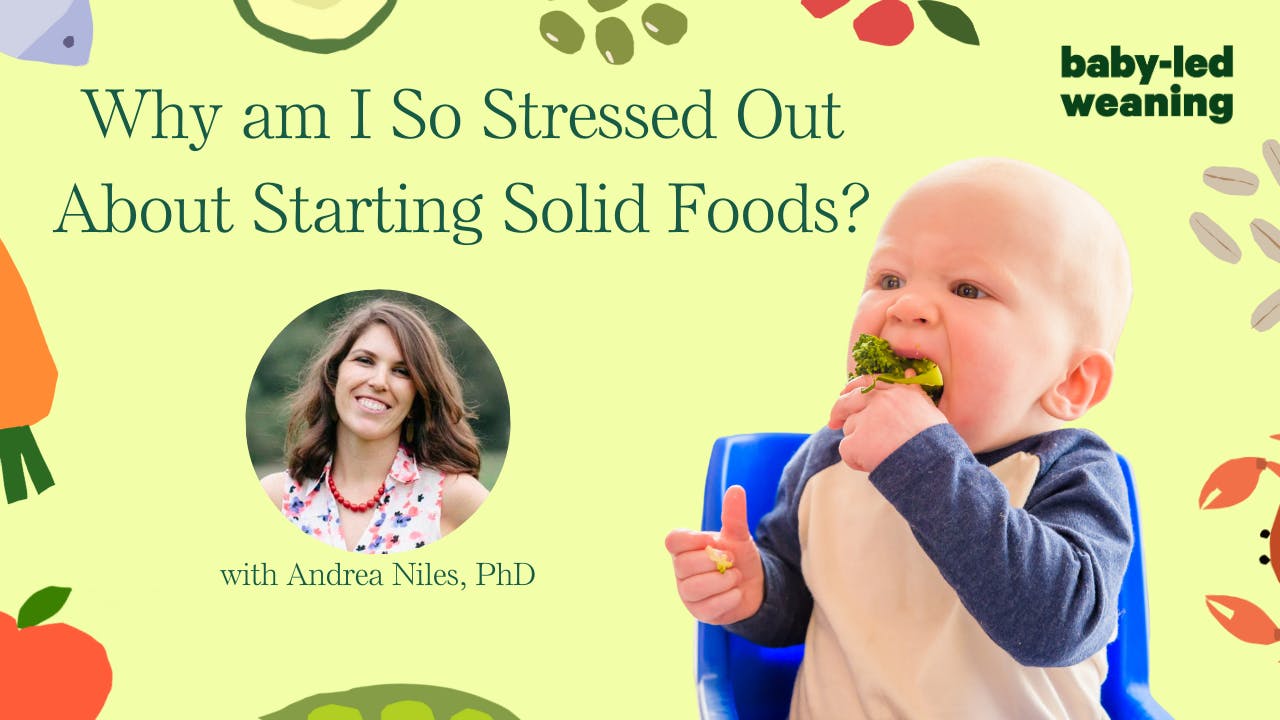
About the Guest
- Andrea Niles is a clinical psychologist and a mom of 2
- She is the founder of Prospera Mental Health and Wellness and provides mental health coaching
Links from this Episode
- Prospera Mental Health and Wellness website: https://prosperamhw.com/
- Follow @prosperamhw on Instagram: https://www.instagram.com/prosperamhw/
- Baby-Led Weaning with Katie Ferraro program with the 100 First Foods™ Daily Meal Plan, join here: https://babyledweaning.co/program
- Baby-Led Weaning for Beginners free online workshop with 100 First Foods™ list to all attendees, register here: https://babyledweaning.co/baby-led-weaning-for-beginners
Other Episodes Related to this Episode

Latest Episodes
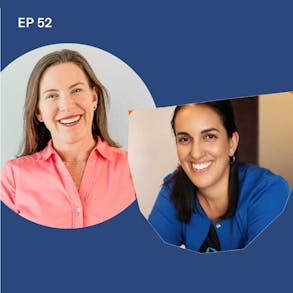
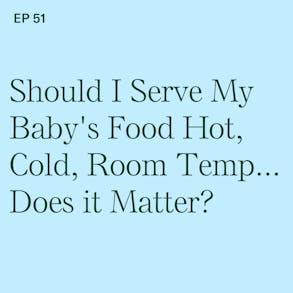
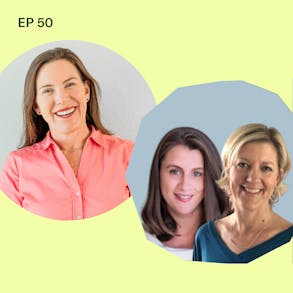
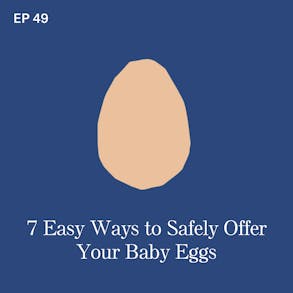

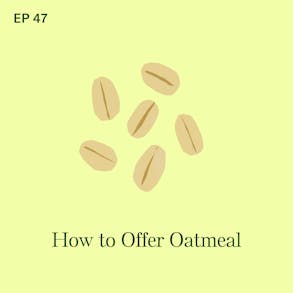
0 (0s):
Are you about to start? Solid foods, but You don't know where to start. Or maybe you started with some purees and now you want to make a switch. The best place To get started learning about starting solid foods safely is my one hour online video workshop called Baby-Led Weaning for Beginners. I just re-recorded this free training and it's packed with videos and visuals on how to safely prep Baby-Led Weaning foods, what it looks like for the first few days, how to reduce choking risk and what to do if your baby has an allergic reaction to food. Everybody on this free training gets a copy of my original 100 First Food list so you'll never run out of ideas about what to feed your baby. Next, you can get signed up for this video workshop at babyledweaning.co.
0 (41s):
If you have one hour to dedicate to learning about Baby-Led Weaning, come take this free online video training and grab your copy of that original a 100 First Foods list. While you're there, again, head to babyledweaning.co to get signed up and I hope to see you there. When your baby is embarking on a new phase of development. I don't know about you guys, but I love a list of what I need to get ready. Sorry, I do not have time to hunt and pack all over the internet and figure it out for myself. Gimme your done for you baby registry list. I want your already written feeding and nap schedule and when it comes time to start solid foods, if you're looking for a list of foods to have on hand, I have a free feeding guide called the Baby-Led Weaning Pantry Planning Guide.
0 (1m 25s):
So this is a 10-page checklist divided by categories of foods, many of which you probably already have in your kitchen, along with tips on how to modify those foods so that you're safe for your baby, even from their first bites. So from spices and seasoning to canned foods and dry goods, this Baby-Led Weaning Pantry Planner has it all. If you're trying to get more organized about expanding the range of foods that your baby tries, you can download the Baby-Led Weaning Pantry Planner for free by going to my website at babyledweaning.co/resources. Again, that free feeding guide the Baby-Led Weaning Pantry Planner is available for you at babyledweaning.co/esources and see which staple foods that are already in your house that your baby could be eating next
1 (2m 16s):
Moms are talking about wanting to reduce their use of social media. They're feeling like they can't trust their own instinct because they're getting so many different messages from social media about how they should be doing things. We support moms in reducing usage or moderating the usage, maybe not following certain accounts that might make them sort of feel that sense of not being confident in their own decision making.
0 (2m 42s):
Hey there, I'm Katie Ferraro, Registered dietitian, college nutrition professor and mom of seven specializing in Baby-Led Weaning. Here on the Baby-Led Weaning with Katie Ferraro podcast, I help you strip out all of the noise and nonsense about feeding, giving you the confidence and knowledge you need to give your baby a safe start to solid foods using Baby-Led Weaning. How's your anxiety level about your baby starting solid foods? I know I hear from moms who are like, I am mortified, I am terrified, I am so nervous that my baby's gonna choke on food or have an allergic reaction, or it's just like so stressful trying to figure out like what food and how much and when to feed the baby and raising babies is stressful and we don't always get the support we need as new moms.
0 (3m 28s):
Today, I'm joined by someone who thinks that we should and can be doing things and supporting new moms in a totally different way. Her name is Andrea Niles and she's a clinical psychologist and mom of two. Andrea is the founder of Prospera, Mental Health and Wellness, and they provide one-on-one weekly sessions with perinatal certified mental health coaches. So in this interview, Andrea's gonna share how she herself had a traumatic birth experience and she recognized that hey, even as a clinical psychologist with all of her training, she personally needed to ask for help in the post partum period, but she ran into one roadblock after another, whether that was shortage of qualified mental health professionals that she could see in a timely manner or to the exorbitant cost of having to pay out of pocket for services if she could even get an appointment.
0 (4m 13s):
So Andrea basically went and created the mental health coaching program she wished that she had access to as a new mom. And in this interview, she's gonna be sharing one of the tools that she developed to help moms who, if you have to have like difficult conversations with other family members or friends who are overstepping their bounds, I personally used this tool, it's called DEAR, I learned about it in this interview with Andrea. I used it with my own husband just today when we were having a, a rather spirited conversation about which of us could be maybe pulling more weight with our kids in the morning routine. So I think so much of parenting is stressful and acknowledging that is important and Dr. Andrea Niles is going to share some coping techniques for you if you're stressed about starting solid foods or you're scared of choking and I really want you to listen to the end because she's gonna share some helpful tips.
0 (4m 56s):
This one really spoke to me and it was if you're like one of those people whose mind always wanders to the darkest place, like I know personally I always think about like the worst thing that could happen to my kids. Like that's my default. She's gonna share exactly how you can reframe those thoughts in a more positive light in this episode.
1 (5m 16s):
When I was just sort of thinking about starting solids with my son, one of my coworkers whose son was a little bit older than mine, came to work one day and talked about how his son actually had started choking on a plum that he was eating. And I remember sort of hearing that story and just thinking, oh my god, that sounds like that's absolutely terrifying. And sort of envisioning, you know, what it was like for him to sort of see that happen and how they reacted. And I, you know, what did you do? And I remember that sort of gave me the sense of like anxiety around what it was gonna look like to start solids with my son.
0 (5m 52s):
And then I'm sure the first time you gave him a plum you were like, this is it. I know what's gonna happen.
1 (5m 57s):
Yeah. I don't think I gave him a plum. I was like, okay, don, don't, I don't think that's, that's a good idea.
0 (6m 3s):
So, I know you've, you shared you are a mom yourself. I know you're a clinical psychologist. I'm just curious what inspired you to specialize in the area of maternal health that you've kind of niched down into?
1 (6m 14s):
So when I had my first baby, I, I actually had a, a really challenging birth. I would say it was traumatic and I remember, you know, thinking about I, I knew I wanted to have another child, but that challenge around, you know, thinking through like, do I wanna go through that again? And so I, I looked for mental health support myself and as someone who's an expert, I simply went to Google and I just Googled and I got on a waitlist and I paid, you know, it took me months to get in. I paid a huge amount out of pocket. And so as someone who is really an expert, I really struggled to find the kind of support that I was looking for. And so that really inspired me to focus on moms because you know, this is a period where moms really need help.
1 (6m 56s):
They need it fast, you know, they can't sit on a wait list. It needs to be easy for them to get going. And so I really wanted to tackle that particular problem.
0 (7m 6s):
In our audience. As I've shared with you, they're parents, caregivers, they've babies that are like around six to 12 months of age, they're starting solid foods. But we also have a lot of clinical healthcare providers who are interested in learning more about infant feeding. And this transition as you shared, you know, just listening to your coworker like, oh my gosh, time to start solid foods can be really stressful for parents, especially if they're dealing on top of it with, you know, postpartum depression anxiety or self-doubt. And you mentioned the fear of choking on the plum. you know, we have a lot of parents who are just terrified to introduce anything other than infant milk or sometimes, you know, maybe pureed foods. Do you have strategies that you can suggest for these parents who might feel like, you know, isolated or nobody else gets me? Or like, is it weird that I'm scared of this thing that may or may not happen?
1 (7m 49s):
Yeah, and I would say maybe there are two kinds of strategies. So one would be to sort of look at the evidence, so sort of looking at kind of the history of, of humankind. You know, this is a, a transition that all humans go through, you know, from drinking milk to having food. And so, you know, humans are very well designed to sort of make that transition effectively. And if you know the chance of dying at six months when you start food was high, you know, we wouldn't be alive anymore. So sort of being able to look at, you know, how likely is it that my child is really going to die as a result of going into this transition? So that, I would say that's kind of one piece of sort of changing how you think about it. And then the other piece is also being able to feel prepared.
1 (8m 29s):
So feeling like you know how to prepare the food to make sure that it's, it's done safely. And, and to also plan, you know, what, what would I do if that did happen to, and to know what the steps are to take to make sure that you can respond effectively.
0 (8m 43s):
I love that idea, like literally what's the worst that could happen? And I think we all go to that place as parents, like I'm constantly thinking about the worst thing that could happen, that's step one. But then looking at the data, how realistic is it that the worst thing that I'm imagining is going to happen and what powers do I have within my control to manipulate that to make a safe eating environment? But you know, it is true children sitting safely in a high chair, like death from choking is incredibly rare. We tell parents death from anaphylaxis in infancy from a food allergy reaction is incredibly rare. Like I know these things can happen, but they're outliers and if we learn a little bit about the safety and look at the data, sometimes it's like, oh you're right. Babies have been transitioning from milk to solid foods for millennia.
0 (9m 26s):
you know, things change the way we do it for sure. But I think what's hard for parents is like we're in this information overload era, right? You've got social media, theoretically it can provide a support network or outlet for parents who feel isolated or alone, but it also, as we all know, can foster feelings of isolation or you know, comparison contribute to negative mental health outcomes. How do you counsel parents who are feeling particularly affected by social media and do you have any suggestions for managing that through modern motherhood?
1 (9m 53s):
On our, our platform at Prospera, we actually have, that's something that comes up often that moms are talking about wanting to reduce their use of social media. They're feeling like they can't trust their own instinct because they're getting so many different messages from social media about how they should be doing things. We support moms in reducing usage or moderating the usage, maybe not following certain accounts that might make them sort of feel that sense of not being confident in their own decision making. And so one of the things that our coaches do and provide is this kind of accountability. So you might set a goal with your coach to reduce your social media use or I'm gonna unfollow these five accounts, you know, this week and then the coach checks in and and checks in with, you know how you did that.
1 (10m 39s):
And so having that accountability to try to make those changes can be really, really helpful.
0 (10m 43s):
I love that idea of accountability. I feel like whenever I talk to a friend they'll be like, well I'm not on Instagram anymore. And I'm like, oh you're so lucky. Like tell me about it. What's it like? Like honestly if I didn't have to do it for work, I wouldn't be there either. But I'm really proud of them, like good for you. Think about all that time that you have back and there's sometimes like, yeah duh. Like why do you think I did it? It sounds so obvious, but the people that actually did it, I'm really inspired by them. So I love this idea of having someone on a platform that could hold me accountable to that and what you say like unfollowing accounts that make you feel bad. If you're constantly thinking about an account, like you should unfollow it and we check ourselves at work, if we find like, hey dude, you've been talking about this account way too much, I think you should unfollow. It's like we're friendly enough to say that and it's kind of nice. I think that your coaches have that relationship where you probably get to know the clients and like, hey, maybe letting go of that account is not the worst thing for you right now.
0 (11m 29s):
So we have some of the stressors related to started solid foods, like it can be intrinsic like we have moms who, you know, they self-report history of or active eating disorders. They will acknowledge, listen, I have a fraught relationship with food myself and don don't wanna project this onto my kids. So there's the internal intrinsic pressures, but there's these external pressures, right? We have maybe a well-intentioned mom or a mother-in-law who comments to me here all the time like, your baby's hungry, your baby needs to start solid foods earlier. That baby's not getting enough from finger foods so you need to spoon feed the baby. Do you have any tips for parents who are stressed from other individuals like outside of themselves and then how do you deal with that?
1 (12m 4s):
That's definitely a tricky one and it comes up across lots of different areas of kind of unwanted opinions or you know, people doing things that you don't want them to be doing when it comes to your your child. And one of the things that we do at Prospera is we, we actually use a very kind of structured tool to help moms actually stand up for themselves and sort of assert themselves. We call it the DEAR Skill and it has four steps where you actually sort of go through the process of describing you know what that person is doing. So maybe it's a mother-in-law and you say, I'm noticing that every time I am trying to feed my child, you have something to say about it and then you tell them how that feels. That really makes me more stressed about my, my parenting.
1 (12m 46s):
You know, can you please stop doing that and just let me sort of focus on feeding my child. I would really appreciate it. I think it would help our relationship. So you sort of walk, we walk them through the sort of steps of how to assert a boundary like that
0 (12m 59s):
Is DEAR an acronym?
1 (13m 0s):
Yes. Yeah.
0 (13m 1s):
So you did describing was that step one.
1 (13m 5s):
Yep. Describe, Express how you're feeling, Assert what you want and then Reinforce that change that you're asking them to make.
0 (13m 13s):
That's fabulous. I find like you can probably put that into a script and cycle it in and out of lots of different situations. I love the example that you gave of just stating outright, you do this often, like that is a fact I'm describing and then it makes me feel like this. Those are such important skills I think we don't, I'm not formally trained in psychology and then they give you all these babies and you're like, oh my gosh. Like you almost need a PhD to help manage all of the outside conversations you have about everything that every decision can be so fraught. So having a tool like that sounds really helpful. In your program, do the coaches teach the clients how to use that? Is that like applicable to lots of different situations? Is a tool like that something that you would just recommend in a certain case?
0 (13m 53s):
Like tell me more about a tool like that 'cause that sounds so useful.
1 (13m 57s):
Yeah, and so the, the way our program works is the coach, you know, depending on what a mom is struggling with, a coach will recommend specific tools. So we have a tools library that has dozens of tools just like that, that dear tool. So the coach will recommend it, the coach might work with you in session to actually practice. So we do role plays where you actually practice talking to that person that you, you want to, you know, change their behavior and then we have, then we'll assign it, you know, we'll assign that tool, you know for practice we have this sort of interactive online tools that moms can use between sessions and then that accountability. So the next week, how did it go? you know, talking to mother-in-law about this or so because it can be obviously really, really hard to, to approach some of these topics.
1 (14m 38s):
So we use it, our clients use it for a lot of things. you know, asking a partner to do more to help is a very common one. Talking with family about, you know, starting boundaries with family and that.
0 (14m 49s):
Hey, we're gonna take a break but I'll be right back. My phone is bursting at the seams with photos of our kids and over the years I've tried all sorts of different ways to store and share them with family members. So for a while I would just text out pictures to the grandparents and then we tried a shared photo album but some people were using Google photos and others preferred Facebook messenger for pictures and the more kids we had the messier it got. Then I stumbled across the FamilyAlbum app. The FamilyAlbum app was created to give parents a secure and easy way to share photos and videos with loved ones. It's a totally secure personal haven for your family's memories. I love that there's no third party ads, no unwanted eyes and it's totally free.
0 (15m 32s):
No more scrolling through endless feeds or searching folders to find the picture of the kid that you need right now. Another cool feature about the FamilyAlbum app is you can order eight free photo prints every month to be delivered to your home. Which if you think about how quickly your baby is changing, it's really nice to have some tangible pictures to hold onto or share to document the last month of your baby's life. If you are looking to level up your photo sharing and organization game with a secure one-stop easy to use photo organization app, head over to the app store, search FamilyAlbum, download the FamilyAlbum app and start creating a legacy of love one photo at a time.
0 (16m 14s):
I think that idea of being able to work with someone in session and role play, like where you can kind of practice 'cause you get nervous, it's like I don't wanna insult you, you are the baby's grandmother, but like it's really making me feel bad, don don't know, like just practicing the words that you're gonna say and having a framework or a script can be so helpful. So that's nice that they have access to that tools library. I wanted to ask you a little bit about food rules 'cause you and I had talked previously when we were getting ready for this interview and I know personally as a dietician and a creator of infant feeding programs, there are some parents who really like meal plans and a roadmap. They like the scripts, they like the tools, the whole like kind of done for you idea of how to introduce solid foods, but then there are other parents who they really wanna curate and formulate their own approach and they kind of bristle at the idea of food rules when it comes to feeding.
0 (16m 59s):
So in your experience, what sort of support can we give parents as they transition their baby to solid food so that you know, we can provide the evidence-based guidance and information like as a registered dietitian that I'm like obligated to provide but like I don't wanna veer too far into the world of you have to do this and you should do that. How do you balance that in parenthood? 'Cause everyone learns differently.
1 (17m 20s):
I always like to start and, and our, our coaches will always start with open questions about, you know, what are you feeling concerned about when it comes to starting feeding or where do you feel like you, you still have questions about how to approach this and sort of figuring out, you know, where they are in terms of their knowledge, you know where they are in terms of what they need help with and what their concern is. And then that gives you, before you sort of launch into, well here are all the rules and here's the food you should prepare and this is how, you know, you have a, a sense of like where they are are and what their knowledge is already and and where they're struggling and where they, they need more information.
0 (17m 55s):
And I think it's a great point 'cause if you are a vegan family with severe food allergies recommending that you do shrimp and shellfish, you know that doesn't connect with them. And that doesn't serve them and there's no reason why they need to do that if you know there's not one size fits all approach. I think that's the nice benefit of your program is that there's that one-on-one opportunity where your coaches can have the time to ask those open-ended questions and then utilize that feedback so that they can craft a tailored plan. 'Cause what works for one family might not work for another family. I know with Prospera you connect mental health coaches with parents to help provide emotional support.
0 (18m 37s):
I'm just curious how mental health coaching is different from therapy and then what are the benefits of working with a coach as opposed to a licensed therapist?
1 (18m 45s):
That's a great question and coaching is a new model. So that's really where our innovation lies at Prospera is we have a lot of moms who are coaches, we bring them on and then we certify them in evidence-based interventions for things like postpartum anxiety and depression and rage, et cetera. I would say the, the biggest difference, our coaches really focus on supporting people with actionable coping tools and strategies that they can use. And so it's sort of very future oriented. We focus a lot on setting goals and figuring out, you know, where do you wanna be, where are you now, where do you wanna be, let's use tools to get you there. So very actionable oriented tools focused.
1 (19m 24s):
One thing that we don't do that licensed therapist or psychiatrist could do, we don't diagnose and we're not treating, you know, psychiatric conditions per se. So we're helping people manage symptoms, reduce anxiety, reduce symptoms of depression. But if someone is, has a more sort of severe issue or they want a diagnosis, then a licensed mental health professional is gonna be the way to go.
0 (19m 48s):
And are the coaches trained to identify where their, you know, scope of practice would stop? And then I, I think at this point you would need to seek further help with this or that professional.
1 (19m 57s):
We have a, a team of clinical psychologists who oversees the coaches. They have very clear guidelines about what kinds of things clients might talk about or start to have challenges would make it outside of our scope of practice. And then we have our protocols around, you know, referring out and getting them connected with a licensed therapist in that case.
0 (20m 14s):
And you mentioned that this Prospera model, it involves coaching, which is a newer model, it is innovative. I can imagine that it also helps cut down on cost. One thing you shared yourself was that after your postpartum experience you had to pay out of pocket and I can't imagine that that was cheap. So could you talk a little bit about how pricing might come into play with your model? 'Cause people are listening like, this sounds great, how much does it cost?
1 (20m 37s):
The reason that this is particularly innovative is that it's solving two massive problems that are facing the mental health field. So one is availability of providers. There are not enough licensed therapists to meet the demand. And so by using coaches and training people who are, you know, amazing, incredible supporters, but they don't maybe have years of education and training. So being able to use that workforce and then train them and certify them to do really, really good work with people allows us to scale it and, and meet the demand. And then the second piece, as you're mentioning is the cost. And so it really drives down the cost of the care. So our sessions are, for our most affordable plan, you're paying $47 per session, which is just a, a fraction of what you would pay for a sort of perinatal specialized licensed therapist.
0 (21m 28s):
Is it FSA HSA eligible I would assume? Yep,
1 (21m 31s):
Yep. So yeah, people can pay with with those accounts and we are, we're working on insurance coverage. That would be something I would love for us to be able to have.
0 (21m 37s):
I would love for you to be able to have that too. 'Cause $47 a session sounds way cheaper than any insurance plan I've ever seen.
1 (21m 45s):
Yeah, and it's similar to the, the copay that you, you know, you would pay with a licensed therapist who we're trying to make it as accessible as possible, but of course driving it down further with insurance coverage would be amazing.
0 (21m 54s):
I know one thing, like for us, I'm a Registered dietitian, dietitians cannot become feeding therapists in the United States. Only speech language pathologists or occupational therapists who have advanced training in infant feeding or pediatric feeding can be a feeding therapist. So I work a lot with typically developing healthy population, but obviously trained if, hey listen, what you're describing does not sound typical. If I were you, I would recommend speaking to your primary care provider and asking for a referral for feeding therapy if they think it's appropriate. Basically passing it off to the people who, who can do it. And sometimes parents, they hear that like feeding therapy and they think it's like a lifelong sentence. Like, oh my gosh, my child's gonna be in feeding therapy forever. And, and we do a lot of education on this is what feeding therapy is, this is how it works, this is talking, having feeding therapists on the show, like this is what I do in a session, this is how it's gonna go.
0 (22m 37s):
And saying like, you know, this is something that, you know, with a couple of sessions in many cases we can give you the tools that you need to either identify if there truly is a problem, give you tools to help you get over or get past the problem. And then you don't need to be in feeding therapy for the rest of your life. I'm curious for your model, on average, how many sessions would a person meet with a coach? Is there like a program where, hey, in five sessions we help you with new parenting and, and most parents can get what they need and get on or other people would maybe need to stay longer. Can you talk a little bit about retention?
1 (23m 11s):
When we look at the data, so we click data on anxiety and depression reduction over, over the course of working with a coach. And so we see at around three months is where people get the, the biggest benefit on average. You know, that's averaged across hundreds of moms. And so that's generally what we'll tell people is about, you know, three months of working with a coach is where you'll really see kind of the, the greatest benefit. Of course it could be less or more depending on the individual. We've had some people in just three or four sessions feel like, okay I'm totally cured. And then people who have stayed with us for, you know, for a year and a half since we, since we were founded. And so it depends on the person and what they're looking for. But usually about 12 sessions is kind of the, the standard for the number of.
0 (23m 52s):
And that's a weekly session, I guess four weeks in a month. Okay. So three months. And you mentioned some of the conditions like talk about rage and postpartum depression and is raising kids across the board is a stressful situation and I'm not a mental health professional by any stretch of the imagination, but I just sense this like since I started teaching in specializing in infant feeding eight years ago, like the anxiety level is palpable and it's only increasing and, and that's even, you know, post pandemic parents are so Stressed out about lots of different things, but starting solid foods, especially with that piece about choking. And you and I have talked a lot about, you know, choking is the primary fear, but there's other things disordered eating or food allergies like food holds and carries with it a lot of emotion for parents who are really stressed out about a multitude of things.
0 (24m 40s):
Can you just share what some of the benefits of coaching are? Like, you, you get access to tools, but in what other ways can it help just hopefully lower that stress level? You're, you're tracking data about reduction in anxiety, what else is happening inside of a coaching session that can help alleviate stress for these parents?
1 (24m 58s):
There's two critical pieces. So the first is feeling like there's somebody who understands what you're going through and someone who's there to listen. And you know, we've known for centuries that just talking about our challenges and our emotions is beneficial to mental health and talking to somebody who is good at being supportive and active listening, that's the one piece. And so, you know, if you look at reviews for Prospera, you'll see that again and again and again, my coach is great listener, she understands me, I feel understood, you know, I feel safe talking about, about whatever I need to talk about. And then the second piece is those, you know, specific coping tools. And so that's sort of woven in alongside this support and understanding is, okay, here's what we're gonna do.
1 (25m 39s):
I'm gonna give you an actual exercise, go home, do it and let's check in and see how it went. And every week you're getting something to work on, something to practice and nd it's really the combination of those two pieces.
0 (25m 49s):
The things that you're practicing, is it always like a dialogue or is it sometimes journaling or what are the actual activities that you're gonna be sent home with?
1 (25m 57s):
Great question. We have a lot of different kinds of activities. We have some sort of educational articles that we'll usually do in the first session. We have interactive tools where you actually walks you through step-by-step. So what was the situation where you felt anxious? How intense was your anxiety? What thoughts were you having? You list the thoughts, what thinking traps? And you have a list of thinking traps and you go through and sort of select where you might have sort of been looking at things in a way that wasn't reflecting reality. And then you try to reframe your thoughts. So the sort of step by step walking through a skill of, for example, reframing or changing your thoughts. We have a couple of mindfulness, a handful of mindfulness activities and I think those, those are sort of the three main categories or types of activities that we have.
0 (26m 40s):
Hey, we're gonna take a quick break, but I'll be right back. This episode is brought to you by Shopify. Forget the frustration of picking commerce platforms when you switch your business to Shopify, the global commerce platform that supercharges your selling wherever you sell with Shopify, you'll harness the same intuitive features, trusted apps and powerful analytics used by the world's leading brands. Sign up today for your $1 per month trial period at shopify.com/tech. All lowercase, that's shopify.com/tech.
0 (27m 20s):
Is there a final thought you can share with moms out there who are listening, they're just stressed to the max about this next phase of their baby's development, making the transition to solid foods. How can we again, if possible in a a short podcast interview episode like this, help reduce the stress associated with this next stage?
1 (27m 35s):
The thing that's most powerful when it comes to anxiety, you know, if you're anxious about starting, you're anxious about getting it perfect or baby choking, just start, start with small steps, start with something that feels comfortable and then start to work your way up to foods that feel a little bit more scary. And that's the most powerful way to reduce our anxiety is to bring it on all at once by by doing the thing that we're afraid of. So facing your fears. And then I guess the second piece would be, you know, if you are really feeling overwhelmed by this, if you're struggling, you don't feel like yourself, there's absolutely no shame in reaching out for support, it does not mean that you're weak or that you're not a good mom or something's wrong with you.
1 (28m 18s):
I think every mother should have support as she goes through this massive life transition into being a mom and all the challenges that come with that.
0 (28m 27s):
At a minimum this is what we need. And so I know you guys are working tirelessly at Prospera to bring that to reality. Where can our audience go if they want to learn more about your program, learn about mental health coaching and then to support your business as well?
1 (28m 42s):
You can check out our website, it's prosperamhw.com so you'll see all the information there about our program and how it works. If you wanna learn more, if you're thinking about maybe trying this, we have a, a free phone consult, you can go on there, schedule it. We have openings, you know, as soon as this evening, tomorrow. So we, so we're really trying to get rid of that wait list. You're not waiting, you can get in, you can get started right away. Schedule a consult and talk with our team and and figure out if it might be fit for you.
0 (29m 7s):
Are the consults with the coaches always on the phone or are they video?
1 (29m 10s):
Initial phone consult is over the phone and then the sessions going forward or videos.
0 (29m 14s):
Thank you so much for your time, I really appreciate it getting to chat with you.
1 (29m 18s):
Yeah, thank you so much Katie.
0 (29m 21s):
Well, I hope you enjoyed that interview with Andrea Niles. She's a clinical psychologist, the founder of Prospera Mental Health and Wellness, their online at prosperamhw.com. I'll link to Andrea's resources on the Shownotes page and in the description for this episode. If you go to blwpodcast.com/420, you can find all of her details. And if you think you might benefit from one-on-one mental health coaching, there's a link there for that free call that she mentioned. I wanna say a special thank you to our partners at AirWave Media. If you guys like podcasts that feature food and science and using your brain, check out some of the podcasts from AirWave. We're online at blwpodcast.com. Thank you so much for listening and I'll see you next time.

The Program Baby-Led Weaning with Katie Ferraro
A step-by-step digital program for starting solid foods safely and navigating the original 100 FIRST FOODS™ meal plan with baby-led weaning.
 EXPERT-LED, PROVEN APPROACH TO EATING REAL FOOD
EXPERT-LED, PROVEN APPROACH TO EATING REAL FOOD CONCISE VIDEO TRAININGS TO MASTER BABY-LED WEANING
CONCISE VIDEO TRAININGS TO MASTER BABY-LED WEANING 100 FIRST FOODS DAILY MEAL PLAN WITH FOOD PREP VIDEOS
100 FIRST FOODS DAILY MEAL PLAN WITH FOOD PREP VIDEOS
Baby-Led Weaning for Beginners Free Workshop
Is your baby ready to start solid foods, but you’re not sure where to start? Get ready to give your baby a solid foundation to a lifetime of loving real food…even if you’re feeling overwhelmed or confused about this next stage of infant feeding.
Get baby-led weaning recipes and tips delivered to your email inbox.

